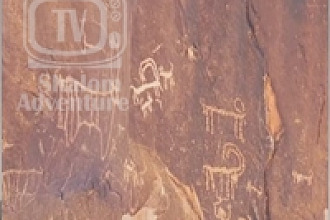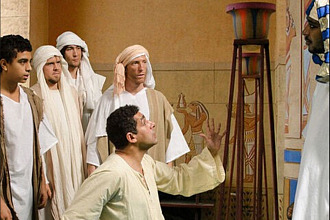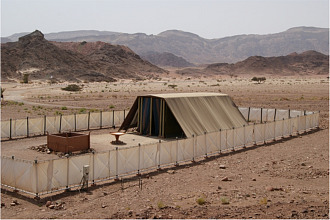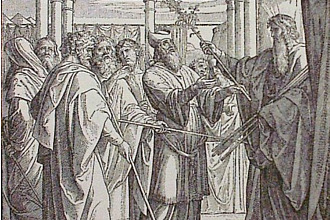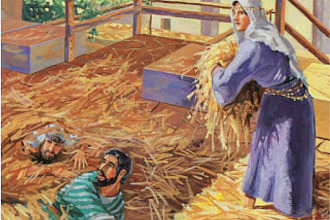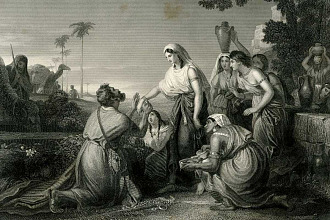Parasha: Ki-Tavo Deut. 26:1–29:18.
Haftara: Isaiah 60:1 – 22.
Besorat Yeshua: Mark 8:1 – 13.
Overview
The first fruits are to be taken to the Temple and given to the Kohen in a ceremony expressing recognition that it is G-d who guides the history of the Jewish People throughout all ages. This text forms one of the central parts of the Haggadah that we read at the Passover Seder. On the last day of Pesach of the fourth and seventh years of the seven-year shemitta (jubilee) cycle, a person must recite a disclosure stating that he has indeed distributed the tithes to the appropriate people in the prescribed manner. With this mitzvah Moshe concludes the commandments that G-d has told him to give to the Israel.
Moshe exhorts them to walk in G-d's ways, because we are a treasured people to G-d.
Huge stones are to be erected and the Torah is to be written on them, after which they are to be covered over with a thin layer of plaster.
Half the tribes will stand on Mount Gerizim, and half on Mount Eval, and the levi'im will stand in a valley between the two mountains. There the levi'im will recite 12 commandments and all the people will answer "amen" to the blessings and the curses.
Moshe then details the blessings that will be bestowed upon Bnei Yisrael. These blessings are both physical and spiritual. However if the Jewish People do not keep the Torah, Moshe details a chilling picture of destruction, resulting in exile and wandering among the nations.
"Joy of the First Fruits"
The Torah states: "You shall take of the first of all the fruit of the land which the L-rd your G-d gives you and you shall put them in a basket and go to the place which the L-rd your G-d shall choose to cause His name to dwell there" (Deut. 26:2). Once in Jerusalem, the basket of fruit was given to the Kohen (priest). The person bringing the basket of fruit would thank G-d for taking the people of Israel out of slavery in Egypt, for all the miracles which G-d has done for the Jewish people, and for bringing them, "to this place and giving us this land, a land that flows with milk and honey." The mitzvah of Bikurim teaches us that before we enjoy the bounty and blessings which G-d gave us, we must first give back what belongs to Him.
The Torah concludes the mitzvah of Bikurim with the following, "And you shall rejoice in all the good which the L-rd your G-d has given you and to your household" (Deut. 26:11). Why does the Torah obligate us with a commandment to rejoice when the natural inclination is to be happy when good things happen to us? The mitzvah of Bikurim also teaches us to be happy and rejoice with whatever G-d has given us. A person who believes that whatever he or she has is a gift from G-d, will not be jealous of others and thus truly rejoice and be satisfied and happy in life. Rabbi Mordechai Gifter, Rosh HaYeshiva of Telse Yeshiva in Cleveland, clarifies with an insight into human nature: "Man's nature is to constantly want more than he presently has. ‘He who has one hundred wants two hundred.’ Our moments of joy are mixed with sadness over what we lack - and this is destructive both physically and spiritually. Therefore, the Torah commands us to feel a joy that is complete - to focus on and rejoice with what we have."
If you think that you will be happy only when you have more, then you will NEVER be happy.
When you finally get what you were hoping for, you will once again focus on getting more and will again feel unhappy. Happiness is dependent upon your state of mind. You can only be happy if you appreciate what you have and what you are presently doing. In Pirkei Avos it states, "Who is the rich person? He who is happy with his portion" (chapter 4). Regardless of what you have, you are only wealthy if you have mastered the ability to appreciate what you have. (This includes appreciating your children, too!) According to Torah, true wealth is measured in terms of happiness! There are many people who are like multi-millionaires who don't know that they are rich because all of their money is sewn into the mattress and they don't know that it is there. Instead, they complain about sleeping on a lumpy mattress!
Rabbi Bunim of Peshischa said, "According to the Torah G-d's good measure of reward is much greater than His punishment. If the punishment for not serving G-d with happiness and gladness of the heart is serving the enemy in exile, how much more so will be His reward for happiness, for then He will surely redeem us from this exile through Mashiach speedily in our days.
One can have eyes, hands, feet, a mind to think with and be depressed -unless he focuses on taking pleasure in these gifts. Imagine if you were blind and suddenly were given the gift of sight. Would you be "flying high"? You would be beyond yourself in happiness! Why wait to appreciate what you have? Make a list of your gifts and for what you are grateful to the Almighty. It is good preparation for Rosh Hashana!
"Self Discipline"
In relating the consequences for not following the Almighty's commandments, the Torah states: "Your life shall hang in doubt before you, and you shall fear night and day, and you will not be sure of your livelihood" (Deut. 28:66).
"Whatever G-d Does is For the Good"
The Talmud relates that Rabbi Akiva would always say, "Whatever G-d does is for the good!" Once on a journey, Rabbi Akiva and his students were refused hospitality at a certain town and had to spend the night in a field. Yet, instead of being upset, Rabbi Akiva said: "Whatever G-d does is for the good!" Rabbi Akiva had a donkey, a rooster to awaken him early, and a lamp for studying Torah. That evening, as he was studying, a wind blew out his lamp. Then a cat pounced on his rooster and ate it. Finally, a prowling lion ate his donkey. Again Rabbi Akiva said: "Whatever G-d does is for the good!" Late that night, marauding troops raided the town and took all its inhabitants captive. The next morning, Rabbi Akiva and his students discovered what happened. He said to his students: "Didn't I tell you--whatever G-d does is for the good! If the lamp would have been burning or the rooster would have crowed, or the donkey would have brayed, we too, would have been taken captive." At times G-d's actions don't reveal any good at all. In situations like these one has to believe and trust in G-d that everything is for the ultimate good. Our rabbis give the following parable to show that insisting on the answer to every question may not always be in our best interest.
HAFTARA: Isaiah 60:1 – 22
Haftara: "Arise, shine; for your light has come, and the glory of the L-RD has risen upon you" (Is. 60:1). These texts speak of the Messiah and His people that shine and reflect the glory of the L-rd, which is His character. His testimony will bring nations and kings to Him and through Him to G-d. "Nations shall come to your light, and kings to the brightness of your dawn" (Is. 60:3). "Lift up your eyes and look around; they all gather together, they come to you" (Is 60:4). He will shine even more to be "radiant" "Then you shall see and be radiant; your heart shall thrill and rejoice, because the abundance of the sea shall be brought to you, the wealth of the nations shall come to you" (Is 60:5). Even the Arabic world will come: "A multitude of camels shall cover you, the young camels of Midian and Ephah; all those from Sheba shall come" (Is 60:6a). "They shall bring gold and frankincense, and shall proclaim the praise of the LORD" (Is 60:6b). God's children who are in exile will come back home, "For the coastlands shall wait for me, the ships of Tarshish first, to bring your children from far away, their silver and gold with them" (Is 60:9a). "for the name of the LORD your God, and for the Holy One of Israel, because He has glorified You" (Is 60:9b). "Your gates shall always be open; day and night they shall not be shut, so that nations shall bring you their wealth, with their kings led in procession" (Is 60:11). Blessings abound, "Your sun shall no more go down, or your moon withdraw itself; for the LORD will be your everlasting light, and your days of mourning shall be ended. Your people shall all be righteous; they shall possess the land forever. . . . the smallest one a mighty nation; I am the LORD; in its time I will accomplish it quickly (Is. 60:20-22).
Besorat Yeshua: Mark 7:24 – 37
One of the themes of the parasha is the joy of bringing to the L-rd the first fruits of the harvest. “And you shall rejoice in all the good which the L-rd your G-d has given you and to your household.” (Deuteronomy 26:11).
Besora: In the text of the besorah, Yeshua wants to give joy to people who have no joy. In those days when there was again a great crowd without anything to eat, he called his disciples and said to them, "I have compassion for the crowd, because they have been with me now for three days and have nothing to eat" (Mark 8:1-2). Yeshua is the one who has compassion for the crowd who is thirsty and hungry.
Yeshua asks his disciples to give food to the crowd, but they don't know how to do it. "How can one feed these people with bread here in the desert?" (Mark 8:4). Yeshua knows exactly how to do it. He asked them, "How many loaves do you have?" They said, "Seven"(5). It is important for the disciples to discover their own incapacities to feed the crowd, that's why Yeshua asks them to be aware of what they have of their asset, "7 loaves." For Yeshua it is enough, he gives them an order. "Then he ordered the crowd to sit down on the ground" (6). Obedience is important, if the crowd or the disciples did not accept full obedience, the miracle could not be done. "He took the seven loaves, and after giving thanks he broke them and gave them to his disciples to distribute; and they distributed them to the crowd" (7). The crowd was a big crowd, "They ate and were filled; and they took up the broken pieces left over, seven baskets full. Now there were about four thousand people. And he sent them away" (8-9). For the Pharisees it was not enough, Yeshua fed 4,000 people with 7 loaves and a few fishes, but they want more signs "The Pharisees came and began to argue with him, asking him for a sign from heaven, to test him" (11). Yeshua did not satisfy their curiosity; they had more than enough signs. "Getting into the boat again, he went across to the other side" (13).




